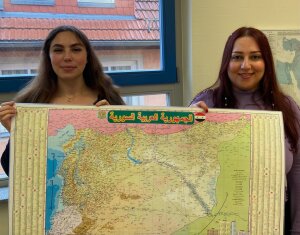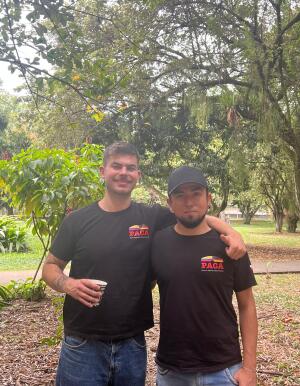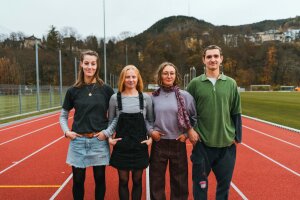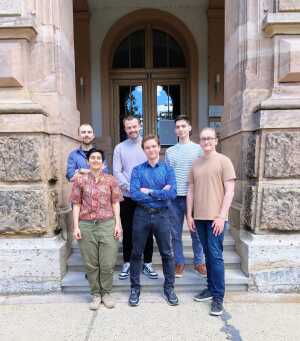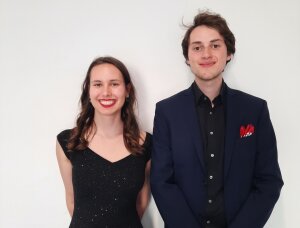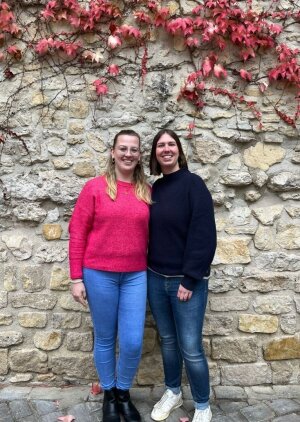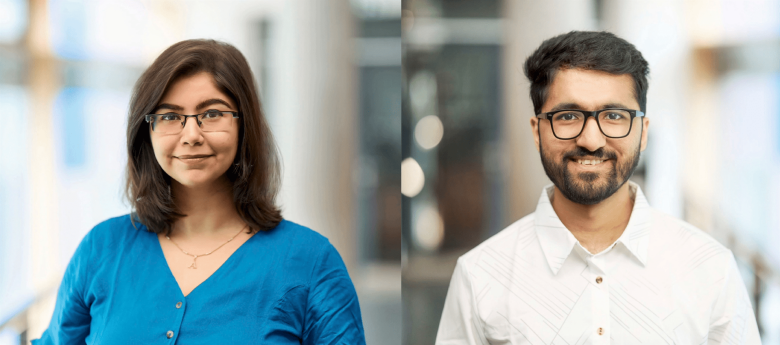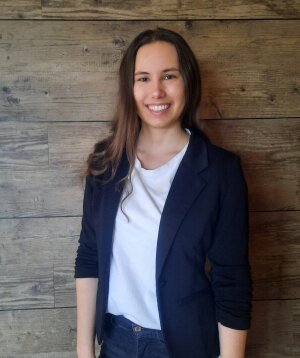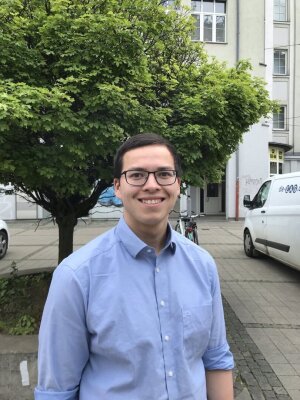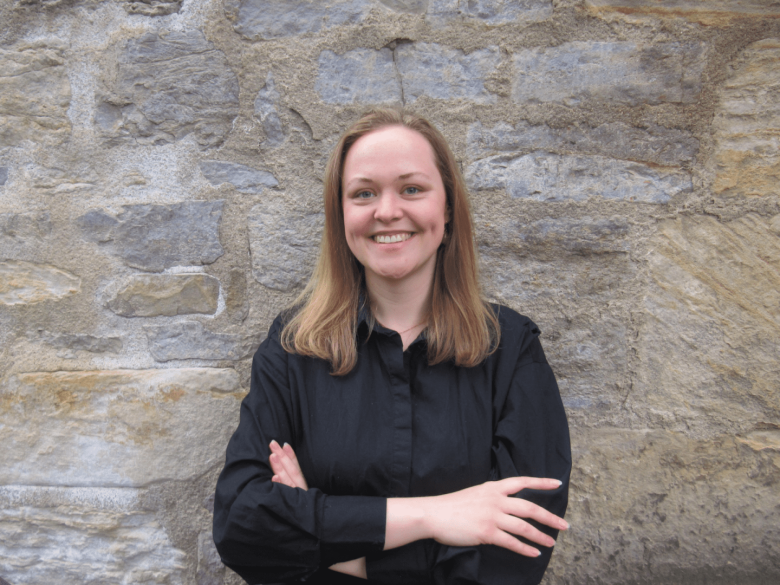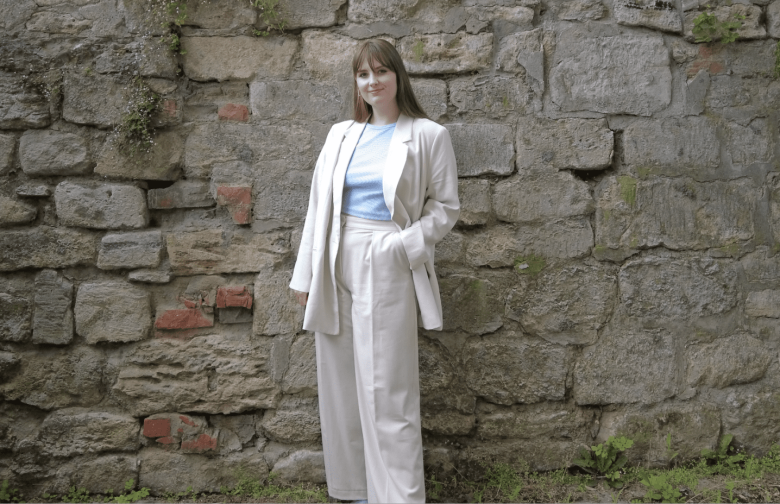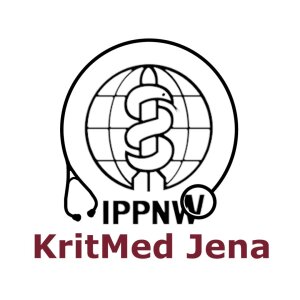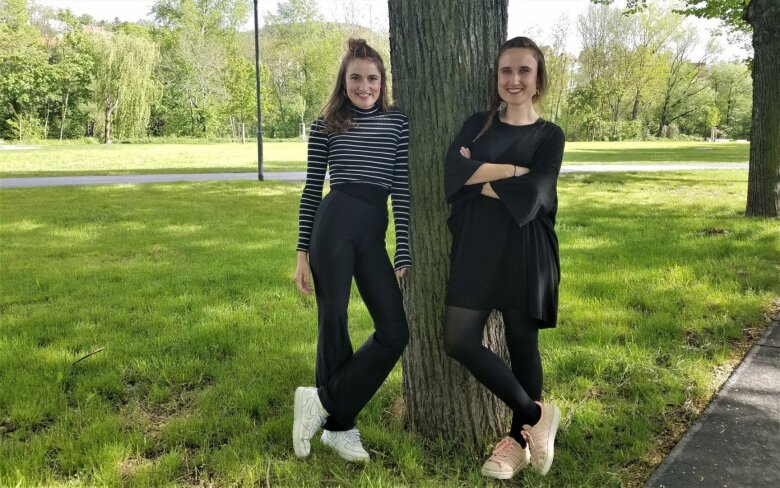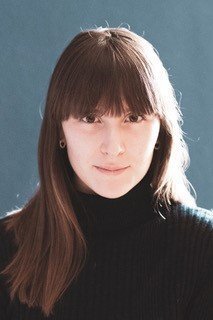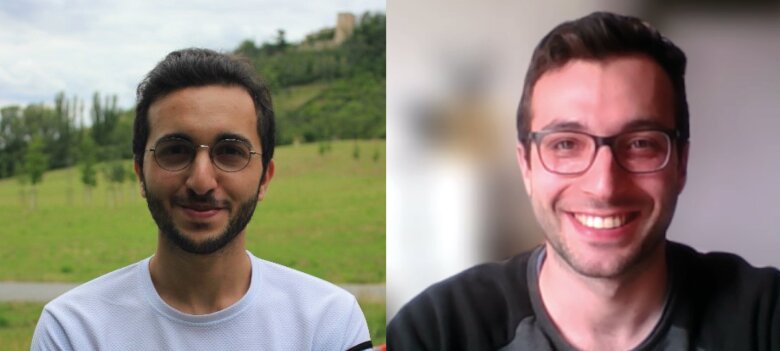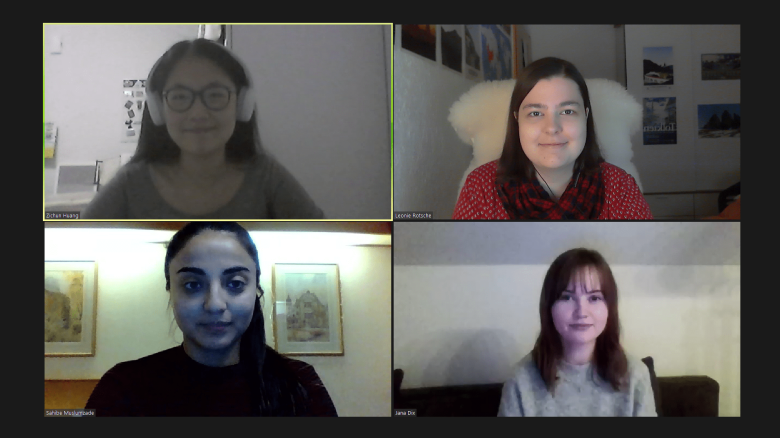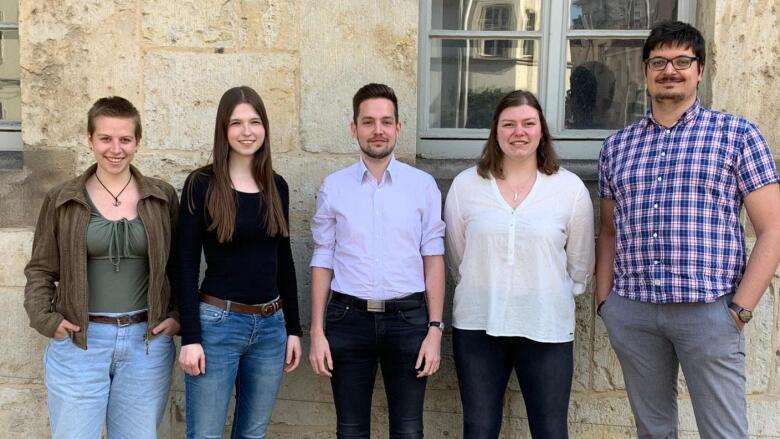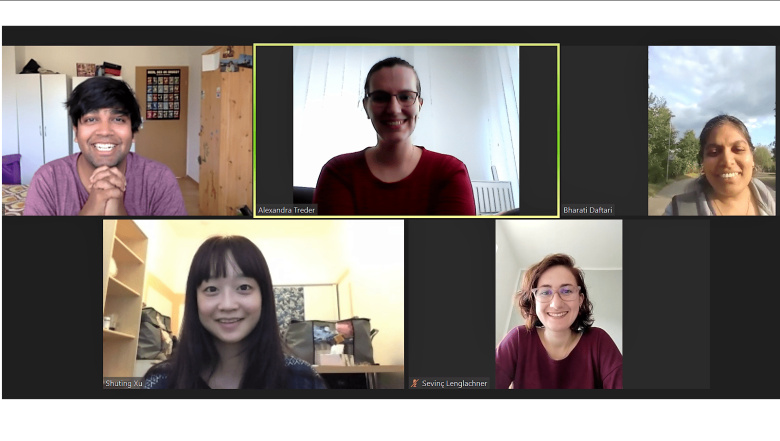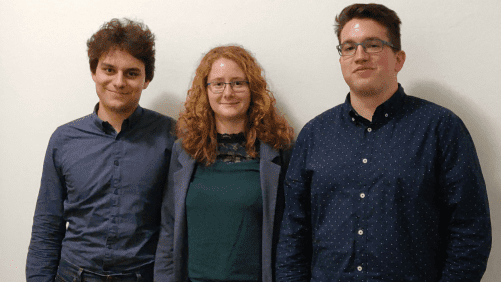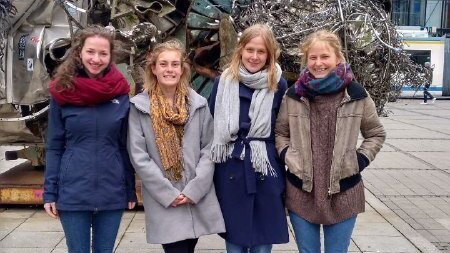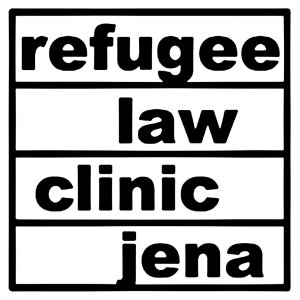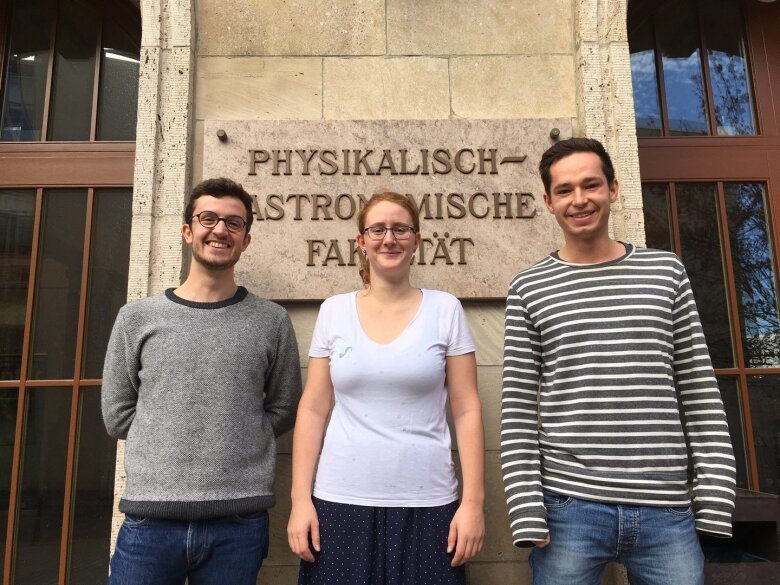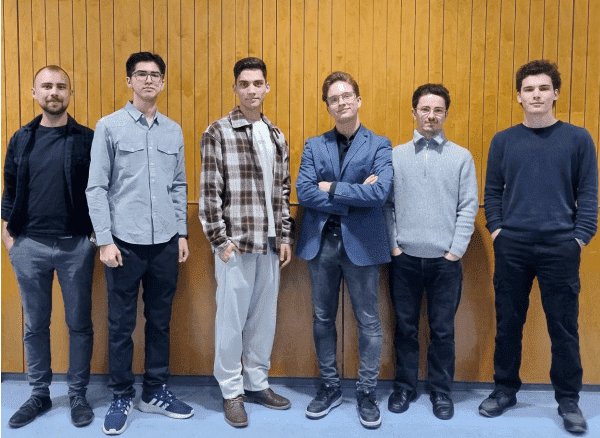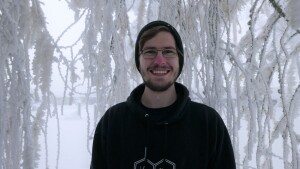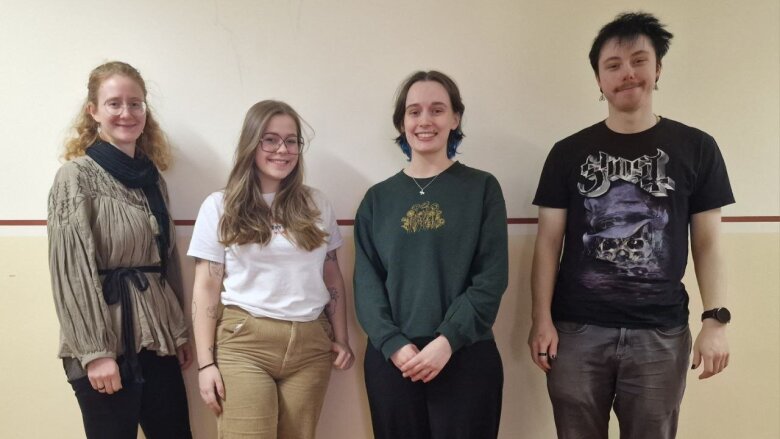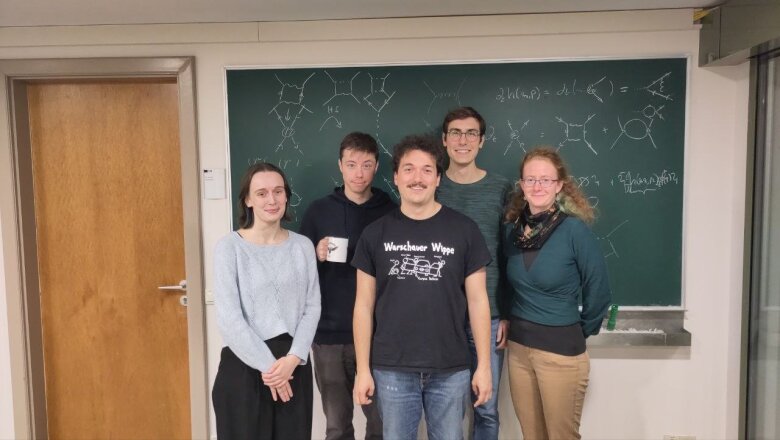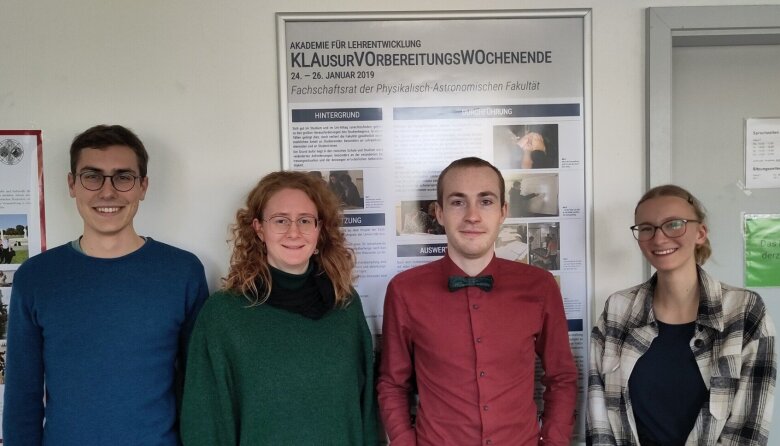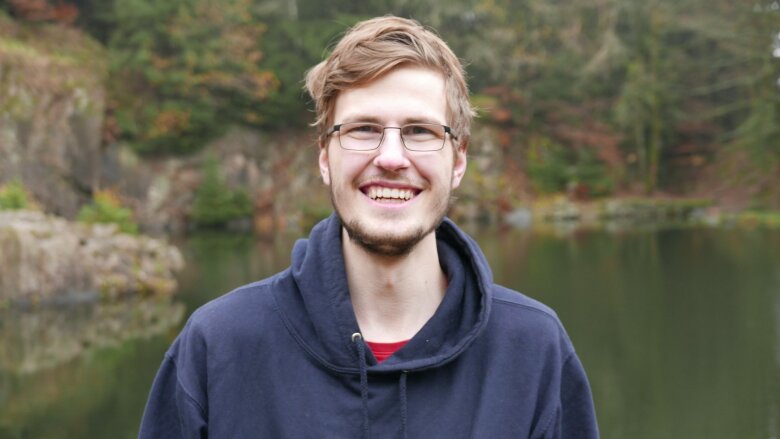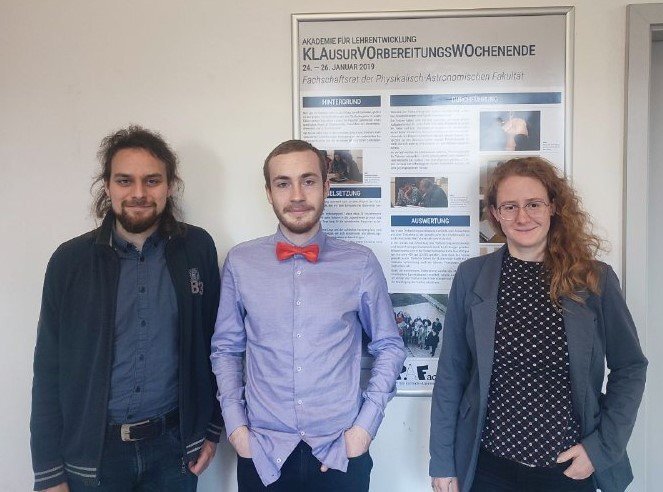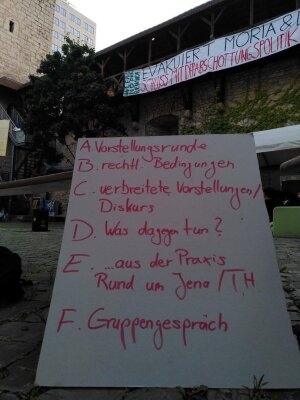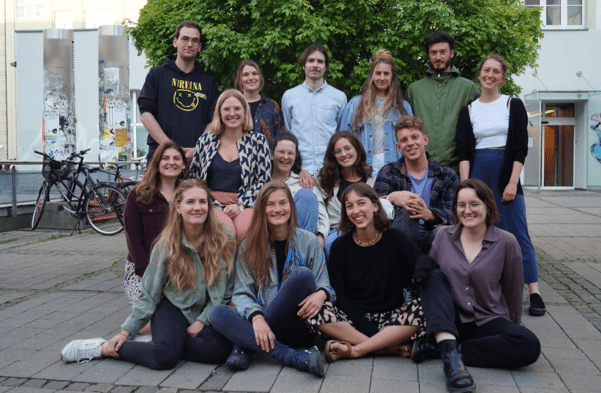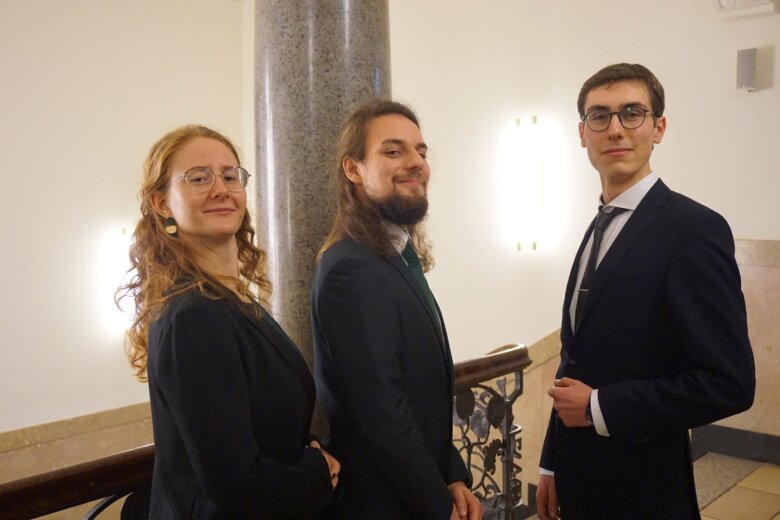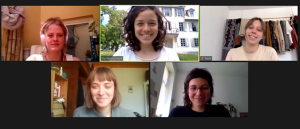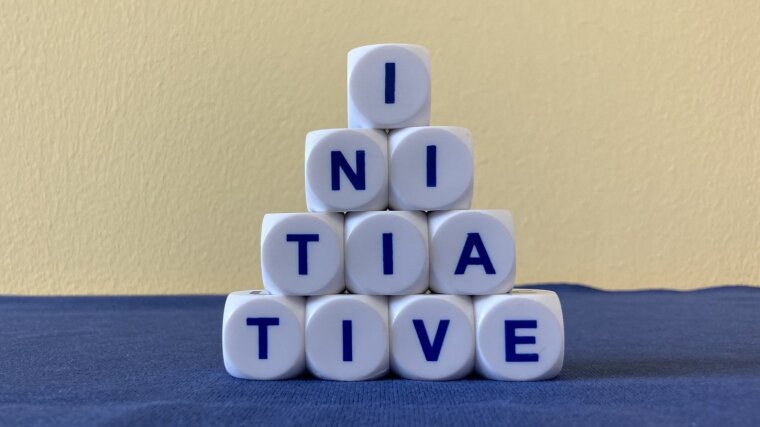
Student Initiatives
funding decision in 2025
-
Mosaic—An Introduction to Syrian Regional Studies
Leonie Thenent and Anahita Hesso (from left to right)
Image: Enrico BoccacciniThe Syrian Arabic dialect is an integral part of the Arabic studies curriculum in Jena. In addition to the language training offered, it is essential to understand the historical, geographical, and social contexts of the country in order to comprehend the realities of Syrian life and communicate effectively. Existing textbooks offer neither comprehensive material nor theoretical reflection on this subject.
The aim of the project is to develop teaching materials that promote critical academic engagement with the subject matter and offer insight into selected topics related to the country. Leonie Thenent is developing teaching materials on the topics of “Syrian history from 1918 to 2011” and “Syrian personalities.” Anahita Hesso, a native Arabic speaker, supplements the content with appropriate texts in Syrian Arabic in order to directly link cultural content with language teaching. The material developed is published on the course website of the Institute of Oriental Studies and incorporated into the ongoing Syrian course. The project forms the basis for the development of further regional topics for the Syrian Arabic course. -
PACÁ - Puente Académico Colombo-Alemán The Colombian-German academic bridge
Oskar Lemke and Mauricio Ayala (from left to right)
Image: Oskar LemkeAfro-indigenous geographies: Territory, ancestry, and epistemologies of the South
From June 8 to 14, 2026, the PACÁ network – Puente Académico Colombo-Alemán, in cooperation with BioGeCo and the Faculties of Humanities and Education Sciences at the Universidad del Valle, invites you to an intercultural event week at the University of Jena.
On five evenings, guests from Colombia, Germany, and Brazil will discuss decolonial approaches to Latin American geography under the guiding concept of epistemologies of the South. The program will conclude with a weekend workshop in the Thuringian Forest—with camping and shared accommodation—led by Professor Adriana Anacona (Yanacona), Professor Marco Aguirre, and activist Mauricio Ayala (all from the Universidad del Valle).
The week opens up an intercultural space for exchange in which students and researchers from Colombia and Germany explore new paths of knowledge together and indigenous and Afro-Colombian perspectives become visible in German geography. -
Democracy in sport
project team (Jana Loose, Jasmin Renz, Luise Flick and Kornelius Grund)
Image: QuentinIn light of increasing social negotiations to preserve democracy, a student initiative is to be launched at the Institute of Sports Science: an action day on the topic of democracy in sports. In a program lasting approximately six hours, consisting of a workshop and discussion formats, democratic actions in sports will be brought to life, reflected upon, and conceptualized.
Students at all stages of sports teacher training, sports teachers, scientists, and coaches are invited to participate. The aim is to highlight the potential of sport for democracy education, to derive concrete options for action in practice, and to develop key democratic skills. The focus is deliberately not limited to school sports in order to also include extracurricular activities. The cross-phase discussion forum is intended to create a project-independent and sustainable structure and enable recurring meetings. -
Establishment of a cross-faculty academic journal for the publication of articles and essays
team: from back to front (l. to. r.): Johannes Freisleben, Jan Wolf, Timur Nematov, Nikita Divekar, Frederic Forkel and Tom Kretzschmar
Image: Nikita DivekarThe academic journal ‘Licht & Wissen’ at the University of Jena promotes the first steps of students into academic publishing practice. The aim is to make outstanding student work from all faculties visible and to strengthen academic writing at an early stage. A quality-assured peer review process gives students the opportunity to publish their theses in a professional environment.
In addition, special thematic issues are published in which interdisciplinary contributions in the form of essays address and reflect on social and academic issues. -
Faust II
project leader: Lena Kirsch and Torben Bunzenthal
Image: privatFaust II is an interpretation and theatre production of Goethe's classic, which focuses on the question of how we deal with injustice as a society. Students from various faculties are involved both on and behind the stage, can design costumes, stage sets, props, etc. and learn new techniques for acting themselves. They will also work with video filming and collages. All students who would like to take part are welcome, there is no limit to the number of participants.
At the same time, this theatre project and the methods of adapting classics will be presented in NDL II seminars in the summer semester 2025. Rehearsals will begin in January 2025 and the performance will take place in December 2025 or in January 2026.
funding decision in 2024
-
'DaZbetrifft: ...: ALLE.' Why (prospective) teachers need to develop intercultural (communication) skills and how they can do it successfully.
project leader: Katja Köhler and Celina Bausewein
Image: Katja Köhler/ Celina BauseweinThis project is based on the overarching question of why teachers of all subjects and school types need to develop intercultural skills. A workshop day will explore in depth the questions of what internationalisation means at school and classroom level and what role the German as a foreign language (GFL) extension programme plays in the development and expansion of intercultural skills and the internationalisation of prospective teachers. The focus will be on the student perspective: We would like to give students of the third subject GFL the opportunity - at an equal level from students for students - to present the third subject GFL to prospective teachers and to report on their experiences and perspectives. In addition to that there will be academic guest lectures and workshops by people from the field. The aim is to enable prospective teachers of all subjects and school types at the FSU Jena to gain an in-depth understanding of intercultural skills and internationalisation during their university education.
-
Photonics Toolkit (Python, Matlab, Mathematica, COMSOL)
project leader Aathira Nandakumar Mooleparambil and Akshay Sunil Bhadage
Image: Fraunhofer IOFMany M.Sc. students of photonics at FSU Jena struggle with important technologies such as Python, Matlab, Mathematica and COMSOL as they have different academic backgrounds. This lack of familiarity affects their performance in internships, research labs and master theses. To address this problem, our project offers an effective solution: comprehensive ‘video lectures’ hosted on the University of Jena's Moodle platform, in which these tools are presented together with important photonics techniques (e.g. mode analysis, beam propagation). This initiative will improve student readiness and efficiency and reduce the burden on teaching staff. Leveraging our experience as educators and video editors with our website (advancedphysics.academy), Udemy courses with over 300 students, and a YouTube channel, we aim to bridge this critical gap and support the academic success of our students.
-
Online exam manager 2.0
project leader: Jonas Neubert
Image: Jonas NeubertThe ALe-funded project ‘Online Exam Manager 2.0’ by a student initiative at the Faculty of Law (FSU Jena) resulted in an innovative chatbot for exam preparation. Originally planned as a web app extension, the chatbot now offers personalised, interactive information on dates, learning opportunities and digital resources as a stand-alone tool. It is characterised by low data usage and cost efficiency. The faculty is responsible for long-term support and costs. Implementation in Moodle/website is in progress and it will soon be available for students to use (status: April 2025).
HereThis link requires a loginde you can find the final project report (URZ login credentials required).
funding decision in 2023
-
The Enea theatre play
project leader Lena Kirsch
Image: Lena KirschThe Enea Theatre is a student production of Heinrich von Veldeke's Enea novel in collaboration with the Institute of German Literature, which was performed at Leuchtenburg Castle near Kahla in June 2024. The initiative originated in an ÄDL-I seminar in the summer semester 2023 and transfers the study of medieval literature to the non-university learning space. The project began with rehearsals in March 2024 and included weekly rehearsals as well as a rehearsal weekend. During the process, we explored the question of how the ancient story of the Trojan Aeneas, which was adapted in the Middle Ages, can be brought to the stage today in a contemporary way. Requisites, costumes and appropriate performance techniques are just as much a topic as the communication of Middle High German to a contemporary audience. The project focusses on inter-semester, interdisciplinary and collaborative work, which is not the case in regular university life.
HereThis link requires a loginde you can find the final project report (URZ login credentials required).
-
Education and equal opportunities in the university context
project leader: Lukas Tran
Image: Lukas TranThe Educational Inequalities lecture series offered all members of the university the opportunity to take an in-depth look at the topic of educational disadvantage and equal opportunities. In five events spread over the summer semester 2023 and the winter semester 2023/2024, various aspects of the topic of educational inequalities were examined. Experts and young academics gave talks on topics such as ‘Elite and excellence in the higher education system’, ‘Equity in educational contexts’ and the international approach to inequalities at universities. The aim was, on the one hand, to offer in-depth opportunities for critical debate within the student body and, on the other hand, to sensitise students who do not deal with the topic as part of their curriculum to the issue.The according flyer for the event series can be found here.This link requires a loginde
HereThis link requires a loginde you can find the final project report (URZ login credentials required).
-
Day seminars on experiential and nature education and BNW (Education for Sustainable Development)
project leader Elisa Topa
Image: Elisa TopaAs part of the project, students of educational science and teacher training were given the opportunity to learn the basics of nature and experiential education as well as ESD in theory and practice during an intensive seminar weekend. The seminar venue, the Naturerlebnishaus Leutratal, offered a learning environment close to nature. The content was taught by an education officer from Naturschutzjugend Thüringen. With their own previous educational experience, the students contributed to the organisation of the seminar in a variety of ways. They were also able to take away various suggestions for their own practice from the final project think tank.
HereThis link requires a loginde you can find the final project report (URZ login credentials required).
-
Online exam manager
project leader: Jonas Neubert
Image: Jonas NeubertThe student initiative at the Faculty of Law at Friedrich Schiller University Jena has developed a project that was originally planned as a web app. Instead, a chatbot was created to help and support students with questions about exam preparation. The chatbot provides personalised information on events, digital tools and learning opportunities.
HereThis link requires a loginde you can find the final project report (URZ login credentials required).
funding decision in 2022
-
'Paper-Club', a literary club to promote interdisciplinary thinking
project leader Madeleine Kündgen
Image: Madeleine KündgenInterdisciplinary exchange is becoming more important, but there are barely any opportunities to learn or promote interdisciplinary thinking. For this reason, the Paper Club was founded.
The concept is that the meetings are led by constantly changing moderators who announce a paper in advance. The meeting itself does not serve to practise presentation skills, but is intended to facilitate interdisciplinary discussions. For this purpose, the moderator briefly summarises the paper and leads into a discussion with cleverly posed questions.
Interdisciplinary exchange is promoted through the participation of students from a wide range of universities and disciplines. The participants are also supported by a gender representative to ensure that science communication is as inclusive as possible.If you are interested, please send me an email: paper-club@mail.de
HereThis link requires a loginde you can find the final project report (URZ login credentials required).
-
'ASA' - Academic writing with App
team of the project with project leaders: Friederike Andrees and Björn Karg (right)
Image: Pia SteinbrückerThe ASA project, funded by the Ale, aimed to advance the development of an app for academic writing. The app is intended to support students in planning and implementing seminar papers and theses. It offers various tools for this purpose, such as timetables, work journals and instructions for writing exercises. In addition, it refers to internal university contact offices such as the University Writing Centre and promotes already existing self-help materials.
HereThis link requires a loginde you can find the final project report (URZ login credentials required).
-
Health care for marginalised patient groups
logo of the university group IPPNW/KritMed
Image: IPPNW/KritMedDuring medical school, there is often limited time to deal with the challenges of caring for marginalised patient groups. However, these people are often encountered by future doctors in everyday clinical practice.
We (the university group IPPNW/KritMedsJena) wanted to eliminate this gap with our central goal of critically questioning the core curriculum of human medicine studies with the event series "Health care for marginalised patient groups". For this purpose, topics on dealing with patients were discussed in the six seminars in the winter semester 2022/2023. The groups were addressed to BIPOC, people with disabilities, people with substance abuse disorders, people with unclear social security status, people with trans identities and communicating with people with low educational competence.
The aim of this series of events was to find conversation strategies for dealing with the above-mentioned patient groups, to reflect on one's own prejudices and privileges in relation to their health care, and to gain an awareness of the problem of medical underuse.HereThis link requires a loginde you can find the final project report (URZ login credentials required).
funding decision in 2021
-
Online conference 'Diversity-sensitive sexual education in biology teaching and didactics' 02.09.-04.09.2021
Project leaders: Anne-Kathrin Ballhaus and Louise Fahrenkamp
Image: Anne-Kathrin Ballhaus und Louise FahrenkampIn the three-day online conference on the topic of "Diversity-sensitive sexual education in biology teaching and didactics", current perspectives are discussed and basics are conveyed. Sexual education in biology lessons is both content ("sex education") and a permanent cross-subject and cross-institutional task in the work with young people. Diversity sensitivity, i.e. the recognition and appreciation of diversity (including gender, sexual orientation, language), is a central competence for biology teachers in order to support the educational and identity development processes of adolescents in the best possible way and to do justice to the inclusive educational claim.
Anchored in biology didactics, the conference was explicitly inter- and transdisciplinary. There were workshops on content and spaces were opened up to network and develop ideas together. In order to bring theory and practice together, students and trainees, their trainers of all phases and professionals of all disciplines of child and youth work and education were cordially invited.
Here [PDF, 13 MB] DEThis link requires a loginde you can find the final project report (URZ login credentials required).
-
Course Digitalisation
Project leader: Hannah Bayer
Image: Hannah BayerThe aim of the project was the competence-relevant learning of digitisation on a photographic level, taking into account cultural studies and museological guidelines.
The collections of the FSU Jena made spectacular objects available to the participants for digitisation. The main focus of the seminar was on learning standardised digitisation procedures. In a subsequent online seminar, the general handling of Adobe programmes was explained.As planned from the beginning, the interdisciplinary character of the event was in the foreground. The project was to be a mixture of practical work and lectures by two external speakers, who addressed the history, theoretical and practical foundations, as well as possible perspectives of object digitisation in their talks.
One of the highlights was the collaboration with the Collections Officer for the "Object of the Month" format in the Collections Portal (sammlungen.uni-jena.deExternal link). We were very pleased to be able to submit digitised objects for the month of November 2021 and January 2022.Here [PDF, 391 MB] DEThis link requires a loginde you can find the final project report (URZ login credentials required).
-
Stand Up & Present – an interdisciplinary journal club
Project leaders: Ahmad Shana'ah and Micha Banz
Image: Ahmad Shana'ah und Micha BanzStudents of human medicine as well as students of the Molecular Medicine have come together in this student initiative to form an interdisciplinary journal club.
Articles from scientific journals as well as data from their own research projects were presented in the course of one semester, on several dates. The events were dynamically adapted to the pandemic situation and were held partly digitally and partly in person in a seminar room at the university. The student initiative was framed by a kick-off event for which we were able to win junior professor Adrian Press as a lecturer and a last seminar, in which a professional voice and speech coach gave us the final impulse for self-optimization in terms of expressiveness and articulation.
Because of a self-designed, digital feedback sheet, we were able to quantify the development of technical and practical presentation skills of all participants and to evaluate them at the end.Here [PDF, 293 KB] DEThis link requires a loginde you can find the final project report (URZ login credentials required).
-
Error culture – Success through culture of error
Project leaders: Christina Sygulla and Alexandra Peupelmann
Image: Christina Sygulla und Alexandra PeupelmannMistakes are part of lifelong learning. However, how these mistakes are dealt with
influences the learning experience and future approach. The goal of the "Error Culture" project was to establish a working group of student volunteers. The
Recruitment was to take place through virtual information sessions, combined with a accompanying onboarding on the topic. After successful onboarding, the working group is to offer interdisciplinary workshops on the topic of "Error Culture - Dealing with Errors" to interested students in the coming semesters. The workshops have
aim: to reflect on the individual handling of mistakes and to offer a platform for the exchange of these experiences in order to show the learning experiences made to the students and to "disempower" this taboo topic of making mistakes and failing. For more information on the student initiative: https://www.fehlerkultur.uni-jena.de DE de.Here [PDF, 4 MB] DEThis link requires a loginde you can find the final project report (URZ login credentials required).
funding decision in 2020
-
Internship Website for German as a Foreign Language – German as a Second Language Students
Project leaders: Zichun Huang, Leonie Rotsche, Sahibe Muslumzade and Jana Dix
Image: Zichun HuangThe project "Internship website for DaF/DaZ students" will help Bachelor and Master students of German Studies Abroad (DaF/DaZ) for easier search for internship opportunities. We have decided to create a Moodle room for possible worldwide internship institutes in order to avoid hours of research in the vastness of the
of the internet. Students will find a overview of different types and locations of internships in this room, divided into continents and countries. Once you have decided on an institution, click on it and you will receive concrete information (e.g. general conditions of the internship, location, website) about the internship as well as information about the contact person as quickly and directly as possible.
Furthermore one finds general information about funding opportunities and a FAQ section, which answers all your questions about an internship.Here [PDF, 794 KB] DEThis link requires a loginde you can find the final project report (URZ login credentials required).
-
'Divided in Unity—30 Years after Reunification.' A Series of Events
Project leaders: Lisa Gersdorf and her team
Image: Max GräßnerThirty years after the German-German reunification, we feel it within society in general, but also at the University in particular: we are not yet ‘unified Germans’. Many still feel like Ossi or Wessi and condemn the other as Jammerossi or Besserwessi. This feeling of ‘us’ and the ‘others’ is still an East-West German problem today, which the next generation also feels exposed to. Through our series of events, we aimed to raise awareness of the mental division. Within these events, people from different generations who study, teach or work at the university, from the old and new federal states, were able to come together and exchange their own experience, values and wishes. Through listening to and discussing with one another, trust and understanding are to grow, allowing for sympathy for the ‘other’.
Here [pdf, 3 mb] deThis link requires a loginde you can find the final project report (URZ login credentials required).
-
Learning Foreign Languages with Methods from Drama and Narrative Pedagogy
Project leaders: Alexandra Treder and Sora Meyberg
Image: José Adolfo Carril PaniaguaBy using methods from drama and narrative pedagogy in foreign language teaching, communicative ability to act, intercultural competence as well as holistic and creative learning processes can be promoted. In the study programme German as a Foreign and Second Language, the didactic-methodical concepts of drama and narrative pedagogy have so far only been dealt with theoretically. On two dates in the summer semester of 2021, students were given the opportunity to practically apply games and methods from drama and narrative pedagogy and to reflect on their possible applications in the teaching context. The workshop was led by professional drama and storytelling pedagogue Maria Carmela Marinelli, who also placed a focus on teaching methods of multilingual storytelling. With this impulse to promote multilingualism, the workshop offered further points of contact with a broad spectrum of central topics in the DaF/Z degree programme.
Here [pdf, 24 mb]This link requires a loginde you can find the final project report (URZ login credentials required).
-
'Countering Discrimination—Shaping Diversity', Series of Events by and for Students and Interested Parties
Project leaders: Alexandra Treder and her team
Image: PrivatThe online conference was aimed at students and lecturers in educational study programmes as well as interested parties. We understand discrimination as something that affects everyone. Prospective German as a Foreign Language / German as a Second Language teachers do not only teach German, but also talk about social, political and historical issues with the participants, e.g. in the context of integration courses. Therefore, we are looking for answers to the question of how to talk to each other about controversial issues—both privately and in professional, i.e. in our case teaching-learning contexts—while remaining appreciative and culturally sensitive and at the same time representing one's position. In workshops, lectures and discussion rounds with speakers from academia and practice, possibilities for answering this question were presented and strategies developed together with the participants on how to deal with discrimination and diversity in order to enable peaceful coexistence in a diverse society.
Here [PDF, 4 MB] DEThis link requires a loginde you can find the final project report (URZ login credentials required).
funding decision in 2019
-
Automation of programming exercise
Project leader: Roman Wanusch
Programming exercises are submitted and corrected manually at FSU Jena to a large extent. An automation of the correction would be desirable in order to increase the feedback frequency and to enable more differentiated teaching. There are uncertainties regarding their fit, flexibility, and long-term controllability with available technologies. This project considered suitable systems, one was selected and implemented and tested as an example for the course "Structured Programming".
In selecting the platforms, care was taken to ensure that it was as open as possible, which was achieved through the use of open source software, an own server and own exercise contents. As a result, it was demonstrated that a self-controlled technical solution integrated into our Moodle environment is possible. Recommendations for further development of automation of programming training are given.Here [PDF, 439 KB] DEThis link requires a loginde you can find the final project report (URZ login credentials required).
-
Support in the Introductory Phase of Studies
Project leaders: Tjorben Matthes, Katharina Wölfl and Georg Schwartz
Image: Tjorben MatthesFinding one’s way around studies and everyday life at university is one of the first major challenges of starting one’s studies. In many cases, this succeeds, but the faculty usually loses a noticeable proportion of students, especially female and male students in teacher training programmes.
In order to reduce dropout rates and retain students in the long term, a large-scale support programme for new students is presented here.
Beginning with the introductory days, the first-year students are supervised in small groups by student and professor mentors, who are available as contact persons both for subject-related questions and as private reference persons.
In addition, as was the case last year, an exam preparation weekend for first-semester students will be offered at the end of the next winter semester (24 to 26 January 2020).HereThis link requires a loginde you can find the final project report (URZ login credentials required).
-
Lecture series 'Footnotes in Psychology’
Project leaders: Lea Stegmann and her team
Image: Lea StegmannIn the winter semester 2019/2020, peripheral areas of psychology will come into focus on six different dates, for example environmental psychology or culture- and migration-sensitive psychotherapy. Despite the topicality and socio-political relevance of these topics, they are rarely mentioned in the course of psychology studies. In the lecture series ‘Footnotes in Psychology’, these topics will be examined and intensively discussed. The aim is to impart knowledge, arouse curiosity and stimulate a critical examination of the topics through informative and interactive evenings. Academics and professionals from the field organize the events and offer an insight into research and practice with a lecture, a workshop or a panel discussion. Emphasizing the interdisciplinary character of the topics, the events are aimed at students of all disciplines.
HereThis link requires a loginde you can find the final project report (URZ login credentials required).
-
Refugee Law Clinic Jena – clinical legal education
Logo of Refugee Law Clinic Jena
Graphic: Refugee Law Clinic JenaStudents of the University of Jena founded the Refugee Law Clinic JLC Jena in 2016. We offer an open consultation hour for refugees several times a week. In addition, we organize an annual training programme in asylum and residence law. Fellow students who have successfully participated in this can then join us as counsellors after a period of observation. In accordance with the idea of clinical-legal education, we want to give our students the opportunity to complement their theoretical studies with practical work. At the same time, we want to contribute to effective access to (human) rights and support people in an often particularly precarious situation through a low-threshold offer. We are in close contact with fully qualified lawyers who specialize in migration law and provide us with expert advice.
HereThis link requires a loginde you can find the final project report (URZ login credentials required).
funding decision in 2018
-
Implementation of in-class on-line quizzes
Project leaders: Aleksandr Kazakov und Anna Zherdeva (M.Sc. Economics students)
The project referred to scientifically proven study strategies improving learning processes such as spaced retrieval, interleaved practice, generative learning and self-assessment.
The project tended to the implementation of these strategies into the in-class learning process: In selected courses, students involvement is to be enhanced by performing a short quiz at the beginning of each lecture. The questions target on recapitulating the content of previous lectures as well as building bridges towards subsequent subjects and areas of application. The quizzes will be implemented by using online quiz services such as Moodle. The results will provide regular feedback on the learning progress.
The project corresponds with the aims of the Facultys working group Neue Medien in der Lehre and was carried out in close consultation.
HereThis link requires a loginde you can find the final project report (URZ login credentials required).
-
Exam preparation weekend
Project leaders: Tjorben Matthes, Katharina Wölfl and Georg Schwartz
Image: Anna Katharina WölflAt the end of the winter semester (25 to 27 January 2019), the student council of the Faculty of Physics and Astronomy organizes an exam preparation weekend for first-year students. For this purpose, about 50 students and 10 tutors travel to Bad Sulza for three days to study for the upcoming exams. This project serves to accompany and support the first semester students.
The students from the first semester who participate are offered an optimal learning environment: group rooms to work in, a large pool of exam questions, fellow students studying for the same subjects, and finally tutors from higher semesters who are available to answer questions and give tutorials. In addition, short oral mid-term exams take place in between, through which students receive individual feedback on their learning progress. On the last day, students can write mock exams in the individual subjects to simulate the real exam situation.
HereThis link requires a loginde you can find the final project report (URZ login credentials required).
Student Initiatives PLUS
funding decision in 2025
-
Continuation of the establishment of an interdisciplinary scientific journal for the publication of articles and essays – Light & Wissen
Team – from left to right: Johannes Freisleben, Sharofiddin Abdurakhmonov, Timur Nematov, Frederic Forkel, Maximilian Greb, Tim Wesemann; not pictured: Elias Brohmer, Fenja Deichmann, Jan Wolf, Tom Kretzschma
Image: Frederic ForkelThe scientific journal “Licht & Wissen” (Light & Knowledge) at the University of Jena encourages students to get started in academic publishing. The aim is to highlight outstanding student work from all faculties and to strengthen scientific writing at an early stage. A quality-assured peer review process gives students the opportunity to publish their student research papers in a professional environment.
In addition, special thematic editions are published in which interdisciplinary contributions in the form of essays address and reflect on social and scientific issues. -
Refugee Law Clinic Jena - Service learning in asylum and residence law
Logo of Refugee Law Clinic Jena
Graphic: Refugee Law Clinic JenaThe non-profit Refugee Law Clinic Jena e.V. is a student-organised association that provides legal advice for refugees. Our focus is on asylum and migration law. We support migrants and - in particular asylum seekers and refugees - in legal matters via email and telephone counselling, but also in a weekly three-hour free consultation. At the same time, the association offers a training programme to impart knowledge on asylum and residence law for volunteer advisors. This theoretical training programme is supplemented by practical counselling simulations, work shadowing, psychological and legal supervision. This ensures the continued existence of the association's work by continuously increasing the number of counsellors. At the same time, knowledge is passed on to people who can apply it in other organisations. The training programme and consultations take place in close cooperation with fully qualified lawyers. Thanks to the support of the ALe, the organisational effort involved in the training can be supported by personnel.
-
Exam preparation weekend (KlaVoWo) in mathematics
project leader Niklas Menge
Image: Niklas MengeIn order to support first-semester students in the Department of Mathematics in mastering the transition from school mathematics to university mathematics, the FSR Mathematics has been organising the
exam preparation weekend (KlaVoWo for short), during which tutors from higher semesters support first-semester students with exam preparation. Using cards developed over the last few years for the subject of mathematics are used to practise and consolidate important learning strategies and subject-specific skills. This is done in groups if possible.
Materials are also introduced over the weekend to support the organisation of their own learning.
In addition, students are offered a learning development discussion during the weekend in which they are supported in reflecting on their own learning status. At the end of the weekend, students can also write a mock exam under the most realistic conditions possible, on which the students receive feedback from the tutors.project leader: Niklas Menge
-
Exam preparation Weekend PAF 2026
project team (from left to right): Katharina Wölfl, Sarah Gaßmann, Lara Henkel, Ole Fröhlich
Image: Julio VirruetaThe exam preparation weekend (KlaVoWo) organized by the Student Council (FSR) of the Faculty of Physics and Astronomy (PAF) has been a key source of support for first-semester students of physics, teacher training, and materials science for eight years.
The aim of the weekend is to make it easier for students to start their studies and to reduce the high dropout rates in the first semester, which are around 30-40%. Many students have difficulty finding their way around the university, as learning and requirements differ greatly from school. One of the main problems is the high degree of personal responsibility and the increased complexity and volume of the subject matter.
The KlaVoWo is to take place at the Bad Sulza youth hostel, whose isolated location creates optimal
conditions for a concentrated learning atmosphere. There, students work on challenging tasks individually and in groups and receive support from expert tutors. The tutors not only provide technical assistance, but also offer motivation and guidance. Participation helps students to engage intensively with the material from the first semester and familiarize themselves with the learning methods required for university exams. A central element of the weekend is the mock exam that students take at the end. This exam simulates a real exam situation and allows participants to test their knowledge under realistic conditions. This gives them valuable insights into the exam process and helps to reduce exam anxiety.
funding decision in 2024
-
Refugee Law Clinic Jena - Organisation of training for voluntary legal advice
Logo of Refugee Law Clinic Jena
Graphic: Refugee Law Clinic JenaThe Refugee Law Clinic Jena e.V. is a non-profit association organised by students that is committed to providing legal support for refugees. As the only organisation of its kind in Thuringia, the Refugee Law Clinic plays a central role in advising migrants and asylum seekers. Its work focuses on asylum and migration law, with the organisation not only offering a free three-hour consultation every week, but also providing legal assistance by email and telephone.
The Refugee Law Clinic Jena attaches particular importance to the training and continuous qualification of its volunteer counsellors. In addition to a well-founded training programme in the field of asylum and residence law, practical insights are provided through counselling simulations, work shadowing and legal and psychological supervision. This concept not only ensures the continuity of the association's work, but also promotes the transfer of knowledge to other organisations and networks.
The close cooperation with experienced fully qualified lawyers ensures the high quality of the counselling services and training content. The support provided by the ALe is of particular importance here, as it makes it possible to efficiently manage the considerable organisational effort of the training structure through additional personnel resources. The Refugee Law Clinic Jena thus makes a significant contribution to supporting refugees in the region and fills an important gap in the Thuringian counselling landscape. -
Exam preparation Weekend PAF 2025
project team: Lara Henkel, Julio Virrueta, Ole Fröhlich, Adrian Minnich, Katharina Wölfl
Image: Julio VirruetaThe Exam Preparation Weekend (KlaVoWo) of the Faculty of Physics and Astronomy (PAF), organised by the Faculty Student Council (FSR), has been a central support for students in their first semester of physics, teaching and materials science for seven years. The aim of the weekend is to make it easier for students to start their studies and to reduce the high drop-out rate in the first semester, which is around 30-40%. Many students find it difficult to gain a foothold at university, as learning and requirements are very different to those at school. One of the main problems is the high degree of personal responsibility and the increased complexity and quantity of the subject matter.
The KlaVoWo is to take place in the Bad Sulza youth hostel, whose isolated location creates optimal conditions for a concentrated learning atmosphere. There, the students work on challenging tasks in individual and group work and receive support from expert tutors. These tutors not only provide technical assistance, but also offer motivation and guidance. Participation helps students to deal intensively with the subject matter of the first semester and to familiarise themselves with the learning methods required for university examinations.
A key element of the weekend is the mock exam that students take at the end. This exam simulates a real exam situation and allows participants to test their knowledge under realistic conditions. This gives them valuable insights into the exam process and helps to reduce exam anxiety.
-
Refugee Law Clinic Jena - Service Learning in Asylum and Residence Law
Logo of Refugee Law Clinic Jena
Graphic: Refugee Law Clinic JenaThe non-profit Refugee Law Clinic Jena e.V. is a student-organised association that provides legal advice for refugees. Our focus is on asylum and migration law. We support migrants and - in particular asylum seekers and refugees - in legal matters via email and telephone counselling, but also in a weekly three-hour free consultation. At the same time, the association offers a training programme to impart knowledge on asylum and residence law for volunteer advisors. This theoretical training programme is supplemented by practical counselling simulations, work shadowing, psychological and legal supervision. This ensures the continued existence of the association's work by continuously increasing the number of counsellors. At the same time, knowledge is passed on to people who can apply it in other organisations. The training programme and consultations take place in close cooperation with fully qualified lawyers. Thanks to the support of the ALe, the organisational effort involved in the training can be supported by personnel.
HereThis link requires a loginde you can find the final project report (URZ login credentials required).
-
Exam preparation weekend (KlaVoWo) in mathematics
project leader Niklas Menge
Image: Niklas MengeIn order to support first-semester students in the Department of Mathematics in mastering the transition from school mathematics to university mathematics, the FSR Mathematics has been organising the
exam preparation weekend (KlaVoWo for short), during which tutors from higher semesters support first-semester students with exam preparation. Using cards developed over the last few years for the subject of mathematics are used to practise and consolidate important learning strategies and subject-specific skills. This is done in groups if possible.
Materials are also introduced over the weekend to support the organisation of their own learning.
In addition, students are offered a learning development discussion during the weekend in which they are supported in reflecting on their own learning status. At the end of the weekend, students can also write a mock exam under the most realistic conditions possible, on which the students receive feedback from the tutors.
funding decision in 2023
-
Exam preparation Weekend PAF 2024
project team (l. to r.): Adrian Minnich, Katharina Wölfl, Willi Kröning and Julia Fischer
Image: Ben MarskeThe PAF Exam Preparation Weekend (KlaVoWo) took place for the seventh time at the Bad Sulza Youth Hostel on the weekend of 26 - 28 January 2024. It was organised by PAF students and doctoral candidates and sponsored by the ALe, the Faculty of Physics and Astronomy, the PAF Alumni Association, the Helmholtz Institute Jena and the student council of the PAF.
Students in their first semester were able to prepare for the upcoming exams in a shielded environment with the help of tutors and the tasks created for the KlaVoWos. They were able to work together in small groups on simple to very advanced tasks, do maths and discuss together. If no solution was found in the 'peer group' with fellow students, the tutors helped by answering questions and providing food for thought. In order to close even larger gaps in knowledge and understanding, students could take part in tutorials on specific desired topics. In order to be able to assess their level of preparation at the end of the weekend, participants had the opportunity to take part in mock exams and their subsequent discussion.
The KlaVoWo, with its now tried-and-tested concept, is a highly valued and much-used support programme for students in the introductory phase of their studies.HereThis link requires a loginde you can find the final project report (URZ login credentials required).
-
Refugee Law Clinic Jena - Service Learning in Asylum and Residence Law
Logo of Refugee Law Clinic Jena
Graphic: Refugee Law Clinic JenaThe Refugee Law Clinic Jena e.V. enables committed (law) students to deepen their theoretical knowledge through practical experience in voluntary legal counselling in asylum and residence law. This programme is based on the concept of Clinical Legal Education. In addition to the weekly counselling sessions, the core of the association is an annual training series in which in-depth knowledge of migration law is imparted and its application trained. This training serves as an essential foundation for future counselling activities.
As the organisation of this intensive programme and the application for and settlement of the necessary funding applications exceed the time available to the volunteer advisors, an additional assistant was required. This person took on central tasks such as raising funds, writing funding applications, planning and organising events, coordinating with speakers and participants and managing materials and premises. Her responsibilities also included the organisation of an intensive weekend and the final accounting of the project. Thanks to the support of the Academy for Teaching Development, a position of 24 hours per month was created for these organisational tasks.HereThis link requires a loginde you can find the final project report (URZ login credentials required).
-
Exam preparation weekend (KlaVoWo) in mathematics
Project leader: Niklas Menge
Image: privatIn order to support first-semester students in the Department of Mathematics in mastering the transition from school to university mathematics, the FSR Mathematics has been organising the exam preparation weekend (KlaVoWo for short) since 2016, where tutors from higher semesters support first-semester students in preparing for their exams. This involves practising and consolidating important learning strategies and subject-specific skills using cards developed in recent years for the subject of mathematics. Where possible, this is done in groups. In addition, students are offered a learning development discussion during the weekend in which they are supported in reflecting on their own learning status. Materials to support the organisation of their own learning are also introduced and used throughout the weekend. At the end of the weekend, students can also write a mock exam under the most realistic conditions possible and receive feedback from the tutors.
As there was also a great deal of interest among students of other subjects, who also have to take similar modules to maths students, students of IT and physics also took part.HereThis link requires a loginde you can find the final project report (URZ login credentials required).
funding decision in 2022
-
Exam preparation Weekend PAF 2023
project leader: Tjorben Matthes, Willi Kröning and Katharina Wölfl
Image: Ben MarskeFor six years now, the PAF student council has been organising an exam preparation weekend (KlaVoWo) for students in their first semester, which is supported by the ALe and the Faculty of Physics and Astronomy as well as the Helmholtz Institute. During this time, a comprehensive pool of exercises, associated solutions and materials for tutorials was built up. According to previous participants, this preparatory weekend was a great help when starting their studies.
During the coronavirus pandemic, the KlaVoWo was offered completely online in 2021 and as two separate events in 2022, partly online and for a smaller group in person. This year, we have returned to a purely face-to-face format. The weekend took place from 27 to 29 January 2023 at the Bad Sulza Youth Hostel. During these three days, the students learned in an optimal setting: together with their fellow students, they were able to work on difficult tasks and support each other. If necessary, tutors helped them and worked out solutions together. At the end of the weekend, they were able to test their acquired knowledge in mock exams and visualise the exam situation.HereThis link requires a loginde you can find the final project report (URZ login credentials required).
-
Refugee Law Clinic Jena -organization of a lecture series
schedule of the training program of the RLC
Image: Refugee Law Clinic Jena e.V.In line with the Clinical Legal Education approach, the Refugee Law Clinic Jena e.V. offers interested (law) students the opportunity to practically expand their theoretical studies by volunteering as a legal advisor in asylum and residence law. In addition to weekly counselling, the central element of the association is an annual training series in which knowledge of migration law is imparted and its application is practised. The training series is the basis for later counselling activities. An assistant was needed for the organisation since the organisational effort exceeds the capacities of the volunteer counsellors due to the intensity of the training programme. This person was responsible for acquiring funding, submitting applications, planning and supervising events, communicating with speakers and participants, maintaining materials, organising rooms, organising an intensive weekend and accounting for the project.
Thanks to the funding from the Academy for Teaching Development, a position of 25 hours/month could be financed for these tasks.
HereThis link requires a loginde you can find the final project report (URZ login credentials required).
-
Exam preparation weekend (KlaVoWo) in mathematics
Project leader: Niklas Menge
Image: privatIn order to support first-semester students in the Department of Mathematics in mastering the transition from school to university mathematics, the FSR Mathematics has been organising the exam preparation weekend (KlaVoWo for short) since 2016. Tutors from higher semesters support first-semester students in preparing for exams. Important learning strategies and subject-specific skills are practised and consolidated using maps developed in recent years for the subject of mathematics. In addition, the students are offered a learning development discussion during the weekend, in which they are supported in reflecting on their own learning status. At the end of the weekend, a mock exam can also be written under the most realistic conditions possible, for which the students receive feedback from the tutors.
Because there was also a great deal of interest among students of other subjects, who have to take similar modules to students of maths students, students of computer science and physics also took part.HereThis link requires a loginde you can find the final project report (URZ login credentials required).
-
'CampusCouch' workshops and implementation of the application-oriented workshops
project leader: Dorothea Schmitt and team
Image: CampusCouchWe offered thematic workshops in addition to our listening offer for students to expand our student initiative, the CampusCouch. These will expand the courses offered to all students of the Faculty of Social and Behavioural Sciences with practical and application-oriented programmes. In terms of content, the workshops focussed on therapeutic approaches that are not at the forefront of students' studies. A psychodynamic dialogue session, a course on mindfulness-based stress reduction (MBSR) and a systemic workshop were offered. We invited experts from the field to provide professional guidance.
HereThis link requires a loginde you can find the final project report (URZ login credentials required).
funding decision in 2021
-
Exam preparation weekend PAF 2022
Project leaders: Katharina Wölfl, Tjorben Matthes und Adrian Minnich
Image: Michael DimlerFor five years now, the Student Council of the PAF (Faculty of Physics and Astronomy) has been organised an exam preparation weekend (KlaVoWo) for students in their first semester, sponsored by the ALe and the Faculty of Physics and Astronomy. During this time, a comprehensive pool of exercises and their solutions was collocated, as well as materials for tutorials. According to previous participants, this exam preparation weekend is a great help in getting started with their studies.
The KlaVoWo was conducted online for the first time in 2021 but with mixed feedback. A compromise solution was tried out for the KlaVoWo this year, so one was held in presence and one online. The funding of the ALe was used to conduct the face-to-face part, this will be dealt with primarily in the following.
The weekend took place from 28.01.-30.01.2022 in the Bad Sulza youth hostel under appropriated hygiene conditions. During these three days, the students learned in an optimal environment: together with their fellow students. They were encouraged to solve difficult tasks and support each other. If necessary, tutors helped them and worked out solutions together. At the end of the weekend, they were able to test their acquired knowledge in mock exams and get to know the exam situation.HereThis link requires a loginde you can find the final project report (URZ login credentials required).
-
Exam preparation weekend mathematics 2022
Project leader: Niklas Menge
Image: privatIn order to support first-semester students in the Department of Mathematics in mastering the transition from school to university mathematics, the FSR Mathematics has been organising the exam preparation weekend (KlaVoWo for short) since 2016, during which tutors from higher semesters support first-semester students in preparing for exams. Using maps developed in recent years for the subject of mathematics, important learning strategies and subject-specific competences. If possible, this is done in groups. In addition, one of the tutors offered a lecture in which he explained how effective and long-term learning works. In addition, the students are offered a learning development discussion during the weekend, in which they are supported in reflecting on their own learning status. At the end of the weekend, students can also write a mock exam under the most realistic conditions possible, for which they receive feedback from the tutors. Because interest was also very high among students of other subjects who also have to take mathematics, we allowed other students to participate this year for the first time.
Due to the pandemic situation at the beginning of 2022, it was necessary to conduct the KlaVoWo online. The basic procedure of the weekend remained the same, the participants worked together online in groups.HereThis link requires a loginde you can find the final project report (URZ login credentials required).
-
'Footnotes of psychology'
Project leaders: Pia Weinschenk and her team
Image: Pia WeinschenkThe lecture series "Footnotes of Psychology" was founded in the winter semester 2019/20 by students of psychology at the Friedrich-Schiller-University of Jena and will be implemented in the summer semester 2021, in order to give alternative forms of therapy and topics that are generally less represented in the curriculum. One focus was interdisciplinary perspectives and smaller sub-areas of psychology that are not included in the curriculum or cannot be discussed in detail due to resource constraints. The high number of participants reflected the great interest of the students. Inspired by the initiative and the exchange that took place, a student group was formed to continue the project. Again, the project was to take place fortnightly 7 dates from October 2021 to February 2022, topics should be presented and intensively discussed which topics that stimulate a critical, interdisciplinary examination of psychological and societal social topics. The target groups were the psychological students and students from other departments in order to promote interdisciplinary exchange.
Here [PDF, 2 MB] DEThis link requires a loginde you can find the final project report (URZ login credentials required).
-
'Understanding and recognising discrimination – theory & reflexive practice' a complementary event offer
Project leaders: Johanna Poggemann and her team
Image: Johanna PoggemannWe learn in our studies that people should not be limited to their nationality, that
culture is constructed and that changing perspectives is central to intercultural competence. What we would like to see is a space for self-reflection to understand what discrimination has to do with each individual. It also raises the question of how we should concretely discuss around controversial topics, especially when we teachers, create lessons and language courses with students. It takes professional competence to answer the question: Where does tolerance begin, where does it end?
We want to approach this question through lectures, discussions and above all a workshop. For this purpose, we have invited speakers from science and practice, who will deal with the following questions: How does discrimination work? What does it have to do with me? Where am I affected, where am I caught up in discriminatory structures? How can I take a stand when human rights are violated? On what do we argue in such conflicts? And how can I, as a German teacher for foreign and second language, or as a future teacher at schools, address certain values such as equality and diversity in society in a linguistically sensitive way and in doing so balance between cultural sensitivity and the defense of human rights or the Basic Law?
The series of events was organized by the Student Council DaF/DaZ and IWK with the support of the Institute for German as a Foreign and Second Language and Intercultural Studies. The majority of the seminar sessions were open to students and teachers of all faculties as well as to interested external parties. In this way, we facilitated a valuable exchange of different teaching/learning experiences as well as ways of dealing with discrimination and diversity.Here [PDF, 2 MB] DEThis link requires a loginde you can find the final project report (URZ login credentials required).
funding decision in 2020
-
Refugee Law Clinic Jena e.V. — legal and psychological supervision
Logo of Refugee Law Clinic Jena
Graphic: Refugee Law Clinic JenaThe Refugee Law Clinic Jena e.V. offers students especially from the Faculty of Law but also from other faculties, the opportunity to expand their theoretical (law) studies through voluntary legal counseling in asylum and residence law according to the clinical legal education approach.
In order to ensure high quality legal counseling, regular legal and
psychological supervisions were implemented on a monthly basis. So the counseling activities of the Refugee Law Clinic Jena e.V. could be professionalized. Through legal
supervisions, basic legal knowledge in the subject area, current case law and
cases of counseling were instructed, deepened and reflected. The counselors were trained to deal adequately with the psychologically stressful situation of those seeking advice and their role as volunteer counselors in an psychological supervision. A total of 6 supervisions - 4 legal and 2 psychological - were carried out.Here [PDF, 2 MB] DEThis link requires a logindeyou can find the final project report (URZ login credentials required).
-
Exam preparation weekend 2021
Project leaders: Georg Schwarz and his team
Image: Georg SchwartzFor the past three years, an exam preparation weekend has been held in cooperation with the student representative committee of the Faculty of Physics and Astronomy. It was financed with funds from the ALe and the faculty, as well as donations from professors and non-university institutes. During this period, a large pool of exam questions and solutions was created. Since previous participants called the exam preparation weekend a great help, this format of supervised learning is to continue.
For this purpose, a presence exam preparation weekend was planned from 28 January to 30 January 2021. During these three days, the participating first-semester students were offered an optimal learning environment: in digital group workrooms, they could puzzle over difficult tasks together with their fellow students and, if necessary, call in tutors to work out approaches with them. In mock exams, they were abled to test their knowledge and prepare for the exam situation.
The ALe sponsorship enables us to charge only a very small contribution towards expenses, so that participation does not depend on the financial means of the students.
Here [PDF, 10 MB] DEThis link requires a loginde you can find the final project report (URZ login credentials required).
